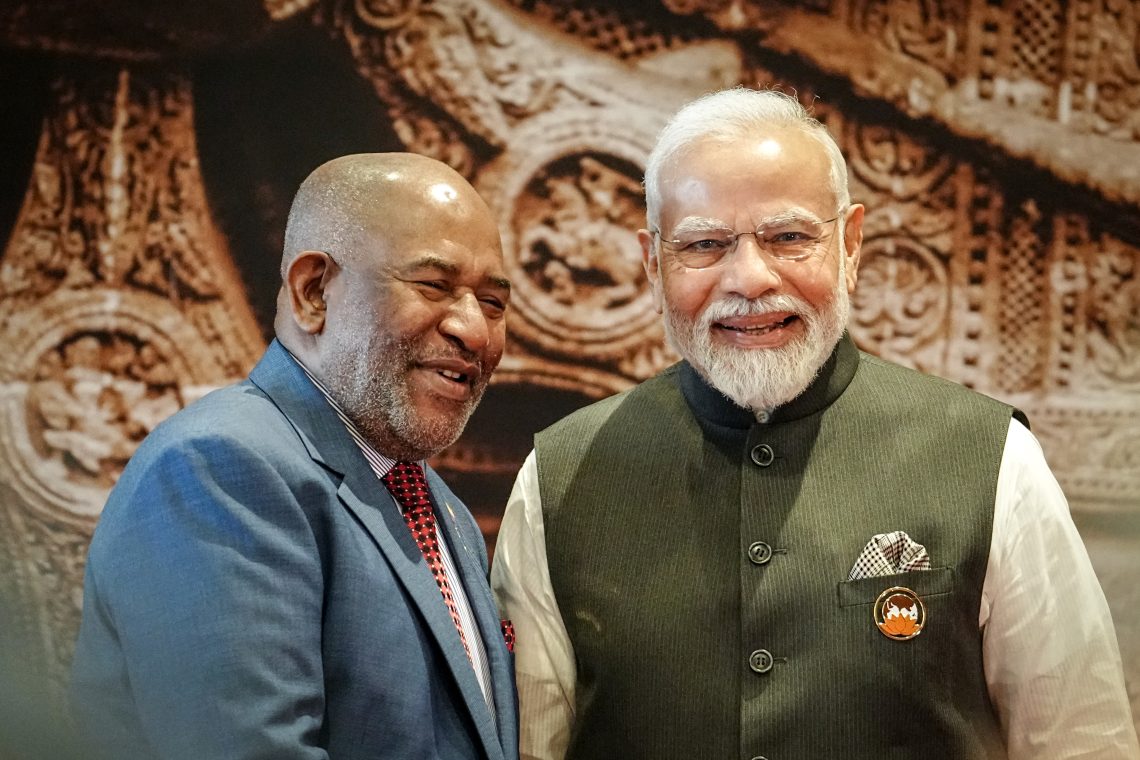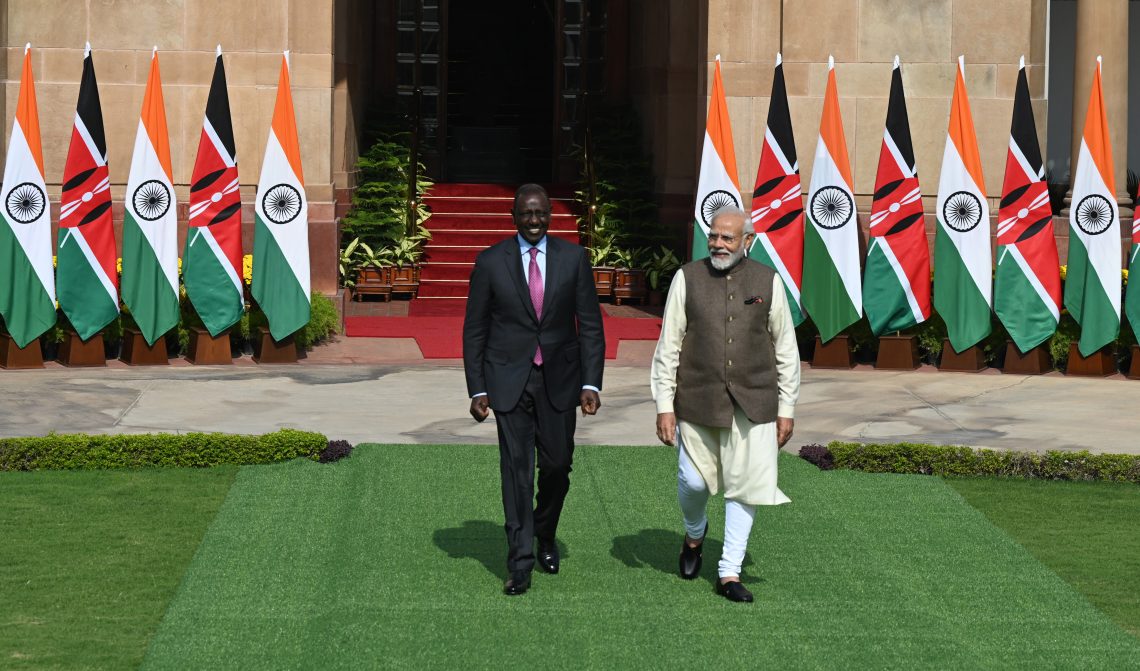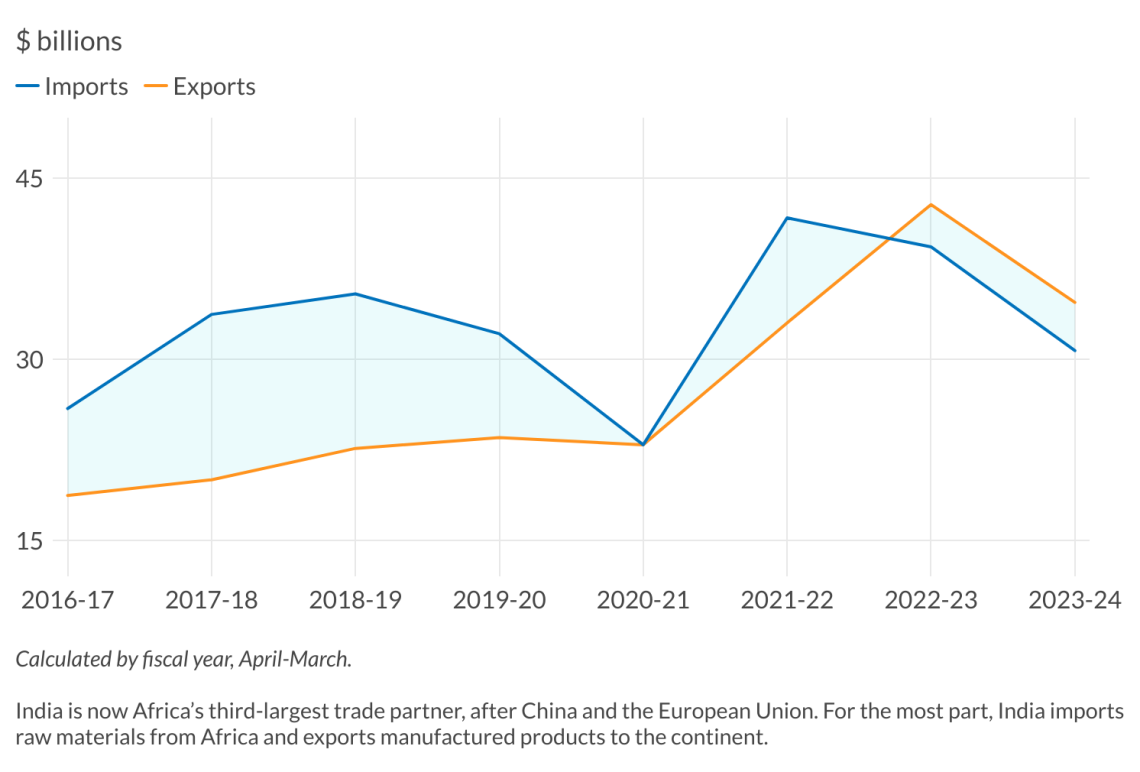India makes its play for Africa
India is taking advantage of close cultural and historical ties to increase its trade footprint and geopolitical influence across the continent.

In a nutshell
- India-Africa relations could benefit from their shared colonial past
- Trade between India and Africa has steadily risen in recent years
- India’s development model could be used as a template in African countries
Change is afoot in India under Prime Minister Narendra Modi. During the G20 summit in New Delhi in September 2023, an official invitation described Mr. Modi as the “prime minister of Bharat.”
Bharat, an ancient name for India (and other lands, perhaps stretching as far as Indonesia), is one of three official names for the country – along with Hindustan and India – given in its constitution. All three names are commonly used at home, though India is the one most commonly heard abroad.
But Mr. Modi, a nationalist, sees the name India as harking back to the times of British colonial rule of the subcontinent. Critics of his government say his Bharatiya Janata Party may want to promote the use of the name Bharat to boost its nationalist agenda.
Still, the wider use of the name would also make sense in terms of the Modi government’s foreign policy, which focuses on national interests and strategic autonomy, and in the case of the African continent a shared experience of past colonialism.
India-Africa relations (unlike, for example, European-African relations) indeed benefit from this idea of a shared past, as well as a shared future. Both sides often invoke the bonds created by their past resistance to colonialism and imperialism, as embodied in leaders like Mahatma Ghandi in India and Nelson Mandela in South Africa. And both resist the idea of a bipolar world order under the hegemony of Washington and Beijing, advocating instead for a multipolar system.
On top of that, the political, economic and demographic challenges faced by India in the past decades resonate today in many African countries, as does India’s political and economic model – a difficult balance between Western-style democracy and nationalism, between protectionism and free trade, and between strategic autonomy and global integration.
This model was termed the “Mumbai Consensus” in 2010 by U.S. economist and Obama administration advisor Larry Summers, who said it could provide an example for other developing nations.
Guiding principles
Meanwhile, Mr. Modi himself set out India’s approach to Africa when addressing the Ugandan parliament in 2018, during which he listed “10 Guiding Principles for India-Africa Engagement.”
The 10 principles include open markets, open trade and a focus on the digital economy (although it must be noted that under Mr. Modi, India has partially resisted trade liberalization by embracing high tariffs and other forms of protectionism, as embodied in the “Make in India” initiative).
India has another competitive advantage in its relations with Africa – its Indian diaspora communities.
The principles also include the fight against terrorism, a threat common to both sides, and the fight for fairer representation of developing countries in international organizations. African countries and India have been in the vanguard of this struggle, demanding reform of the international world order, including stronger representation for the so-called “Global South” in international forums such as the United Nations.
A major advance on this front and an achievement of Mr. Modi’s diplomacy was the announcement at the 2023 G20 Summit in New Delhi that the African Union would become a permanent member of the G20.
Moreover, compared with other actors, like China or the European Union, India has another competitive advantage in its relations with Africa – its Indian diaspora communities, which together number approximately 3 million people. The Indian diaspora in Africa has played an important role in cultural diplomacy and people-to-people cooperation in countries like South Africa, Kenya, Tanzania, Uganda and Mauritius.
Rising trade
These historical, cultural and geopolitical bonds have aided an intensification of trade and economic cooperation between the two sides – India is now Africa’s third-largest trade partner after China and the EU. India-Africa trade has been rising steadily since 2016-2017 (though with a notable drop-off during the Covid-19 pandemic), with Indian exports to Africa exceeding imports for the first time this century in 2022-2023.
Currently, India’s exports to Africa are mostly made up of manufactured products like petroleum and pharmaceutical goods, whereas the biggest share of Indian imports from Africa are raw materials, such as crude oil from Nigeria. Like China, India, which has large coal reserves but is a net importer of oil and gas, has had to venture into foreign markets to secure the energy required to sustain accelerated growth rates at home.
Facts & figures
In addition, recent geopolitical events have made Africa’s role in India’s energy security more prominent, with New Delhi focusing on diversifying energy supply sources. African countries including Nigeria, Angola, Algeria and Equatorial Guinea now account for a growing share of India’s oil imports.
Read more on India’s foreign relations
- Elections in South Asia key for regional dynamics
- India-Russia relations show renewed spark
- India’s evolving strategy in the Middle East
And India has also become Africa’s second-biggest creditor after China. Projects developed under lines of credit provided by India’s Export-Import Bank have been increasing in number and range, with important initiatives being launched in the fields of agriculture and infrastructure. Indian companies have thus become a critical source of foreign investment for many African countries.
India has always played an important role in Africa’s security, being a key contributor to peacekeeping operations.
One illustrative example was the pledge, made by a conglomerate of Indian companies during the G20 meeting, to invest $14 billion in Nigeria. Another relevant aspect is that in Nigeria, Indian-owned companies are estimated to be the second-biggest employers after the government.
Moreover, and in line with the cases of Russia or Turkey, India-Africa cooperation in defense and security is also expanding. India has always played an important role in Africa’s security, being a key contributor to peacekeeping operations. But the announcement by the managing director of India’s Exim Bank that Indian lines of credit to Africa could include ones for arms exports, plus the increasing number of Indian military attaches being deployed across the continent and the holding in 2023 of the first joint meeting of Indian and African army chiefs, signal an important shift and a greater focus on bilateral security cooperation – including in areas like cybersecurity. The shift reflects ongoing changes to Africa’s security architecture.

Demographic trends, rising demand for energy, urbanization and the growing incidence of chronic diseases across the continent are also opening up further space for Indian companies operating in the energy, pharmaceutical and agro-industry sectors. Moreover, as several African countries manage to leapfrog development stages, digital infrastructures, like India Stack – a digital highway that permits payments and biometric identification – are capturing the attention of African governments.
It must be noted, however, that while increasing access to digital services, these types of solutions may also be used as a means of repression and surveillance and thus constitute a permanent threat to basic rights, such as the right to privacy.
Scenarios
Most likely: India-Africa partnership grows in geopolitical significance
Under the most likely scenario of further consolidation of Mr. Modi’s power and political vision, India will likely continue to pursue strategic autonomy as it tries to transition from the status of middle power to great power. Second, but more uncertain, these relations will be affected by the evolution of Africa’s security, political and economic outlook.
Considering this, in the most likely scenario, India’s role within a fragmented international system and in a possibly post-rules-based international order will increasingly be that of rule maker rather than rule taker. The African continent, in turn, acting as a bloc under the African Union, along with individual African countries like Egypt, Morocco, Kenya, Nigeria or Ghana, are expected to further increase their relevance in the international system.
Based on convergence on key issues like debt, climate or resistance to a bipolar world order, and driven by geopolitical, demographic and economic trends (India is expected to become the world’s third-largest economy by 2027, and together India and Africa account for one-third of the world’s population), the India-Africa axis will become increasingly relevant. Both sides are expected to effectively cooperate in multilateral forums like the G20 or the BRICS group, coordinating diplomatic efforts to change the structure of the UN Security Council, or to reshape global financial institutions.
Food security, energy security and maritime security (especially in the Indian Ocean) will likely contribute to deepening bilateral relations between India and some African countries, like Kenya, Ethiopia, Tanzania and Nigeria. Moreover, trade between India and Africa is expected to further increase through the establishment of bilateral free trade agreements or, under a less likely but more impactful scenario, through the adoption of a continental-based approach.
Least likely: India-Africa relations sputter
Under a second, less likely, scenario, India-Africa relations could suffer a downgrade in the medium-term, reflecting the negative impact of one or more of the following events: a severe deterioration of Africa’s security outlook; instability in India driven by political polarization; the adverse effect of persistent high transaction costs; or an intensification of India-China rivalry in the continent, to the detriment of African interests.
For Africa, the consequences of this scenario would be decreasing leverage within the international system, and increasing pressure to choose between one of two axes – Beijing/Moscow or Washington/Brussels.
Moreover, considering India’s competitive advantages when compared with these alternatives, including in the cultural, trade and security domains, this downgrade would negatively impact the development and geopolitical prospects of several African countries.
For industry-specific scenarios and bespoke geopolitical intelligence, contact us and we will provide you with more information about our advisory services.









